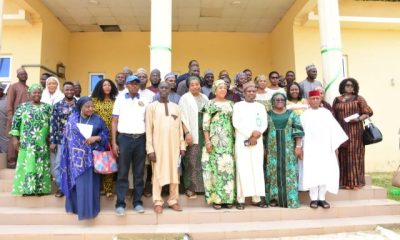Economy
Old, redesigned naira notes remain valid — CBN

The Central Bank of Nigeria has reaffirmed the validity of the old N1000, N500, and N200 banknotes as legal tender, clarifying misinformation circulating about their status.
In a statement signed by Mrs Hakama Sidi-Ali, the Acting Director of Corporate Communications, on Friday, the apex bank confirmed that the Supreme Court ruling of November 29, 2023, permits the indefinite circulation of both old and new designs of these denominations.
The CBN stressed that all versions of the naira, old and redesigned N1000, N500, and N200 notes, as well as commemorative and previous designs of the N100 note, remain valid for transactions.
According to the statement, the bank dismissed claims suggesting that the old series of these denominations would cease to be legal tender by December 31, 2024.
The statement read, “The Central Bank of Nigeria (CBN) has observed the misinformation regarding the validity of the old N1000, N500, and N200 banknotes currently in circulation.
“In line with the Bank’s previous clarifications and to offer further assurance, the CBN wishes to reiterate that the subsisting Supreme Court ruling granted on November 29, 2023, permits the concurrent circulation of all versions of the N1000, N500, and N200 denominations of the Naira indefinitely.
“For the avoidance of doubt, all versions of the naira, including the old and new designs of N1000, N500, and N200 denominations, as well as the commemorative and previous designs of the N100 denomination, remain valid and continue to be legal tender without any deadline.”
The CBN urged Nigerians to continue using both old and redesigned banknotes for their daily transactions while handling the notes with care to ensure their longevity.
Also, the bank encouraged the public to adopt alternative payment channels, such as electronic banking platforms, to reduce reliance on physical cash.
This clarification comes amid growing concerns and confusion among the public about the legal status of the old naira notes as Nigerians struggle with cash scarcity.
Economy
More Nigerians to experience poverty by 2027 – World Bank

The World Bank’s latest Africa’s Pulse report has projects a grim future for Nigeria, with poverty expected to rise by 3.6 percentage points by 2027.
Released during the IMF and World Bank Spring Meetings in Washington, DC, the report cites Nigeria’s reliance on oil, economic fragility, and governance challenges as key drivers.
It highlights the country’s structural economic weaknesses, dependence on oil revenues, and national fragility as key barriers to meaningful poverty reduction.
“Poverty in resource-rich, fragile countries, including large economies like Nigeria and the Democratic Republic of Congo, is projected to increase by 3.6 percentage points between 2022 and 2027,” the report stated.
Despite recent growth in Nigeria’s non-oil sector during the last quarter of 2024, the World Bank warns that this progress is unlikely to translate into widespread poverty alleviation due to ongoing fiscal and institutional challenges.
The report emphasizes that Sub-Saharan Africa remains the world’s poorest region, with an overwhelming 80% of the globe’s 695 million extreme poor residing there in 2024.
Within the region, half of the 560 million extremely poor people were located in just four countries, including Nigeria.
In stark contrast, South Asia accounted for 8% of the world’s extremely poor population, East Asia and the Pacific 2%, the Middle East and North Africa 5%, and Latin America and the Caribbean 3%.
The World Bank attributes the rising poverty in Nigeria and similar economies to weakening oil prices and fragile governance structures, noting: “This follows a well-established pattern whereby resource wealth combined with fragility or conflict is associated with the highest poverty rates, averaging 46% in 2024, which is 13 percentage points higher than in non-fragile, resource-rich countries.”
Meanwhile, non-resource-rich countries in Africa are experiencing stronger economic growth and faster poverty reduction, buoyed by high agricultural commodity prices and more resilient fiscal policies.
To reverse Nigeria’s downward poverty trend, the World Bank recommends reforms that prioritize inclusive economic growth and stronger public financial management.
It calls on the government to focus on “improving fiscal management and building a stronger fiscal contract with citizens to promote inclusive economic development and long-term poverty alleviation.”
Economy
SEE current exchange rate of the Dollar to Naira

What Is the Dollar to Naira Exchange Rate at the Black Market (Aboki FX)?
Here is the Dollar to Naira exchange rate at the parallel market, popularly known as the black market (Aboki fx), for Tuesday, April 23, 2025.
You can exchange your dollars for naira at the following rates:
Black Market Exchange Rate (Lagos – April 23, 2025):
According to sources at the Bureau De Change (BDC), the exchange rate at the Lagos parallel market saw traders buying at ₦1610 and selling at ₦1620 per US dollar.
It’s important to note that the Central Bank of Nigeria (CBN) does not recognize the black market. The CBN advises individuals seeking foreign exchange transactions to do so through their banks.
Dollar to Naira Exchange Rates
Market Type Buying Rate Selling Rate
Black Market ₦1610 ₦1620
CBN Official Rate ₦1591 (Low) ₦1606 (High)
Note: Forex rates vary across dealers and regions, and actual rates may differ from those listed.
Meanwhile, the Nigeria Customs Service (NCS) has announced the seizure of 298 smuggled items worth ₦7.6 billion between January and March 2025. The NCS also disclosed that it generated a total revenue of ₦1.75 trillion in the first quarter of the year.
Economy
Volvo announces termination of 800 U.S. workers, cites tariff, market decline

Volvo Group has announced plans to lay off up to 800 workers at three of its U.S. facilities over the next three months, citing ongoing market uncertainty and declining demand exacerbated by tariffs introduced under the administration of President Donald Trump.
The affected locations include the Mack Trucks plant in Macungie, Pennsylvania, as well as Volvo Group sites in Dublin, Virginia, and Hagerstown, Maryland.
In a statement on Friday, Volvo Group North America confirmed that between 550 and 800 employees would be impacted.
The company, a subsidiary of Sweden’s AB Volvo, employs nearly 20,000 people across North America.
The layoffs come amid wider turmoil in the automotive and manufacturing sectors, as shifting U.S. trade policy and a series of tariffs continue to drive up production costs. Economists have pointed to the uncertainty surrounding Trump’s trade strategy as a factor undermining both business and consumer confidence, with concerns mounting over a potential economic slowdown or recession.
According to Volvo, the company is grappling with a decline in heavy-duty truck orders, driven by instability in freight rates, anticipated regulatory changes, and the growing financial burden of tariffs. “We regret having to take this action, but we need to align production with reduced demand for our vehicles,” a company spokesperson stated in an email quoted by Reuters.
Volvo’s announcement marks another blow to an industry already navigating a complex web of supply chain challenges and fluctuating market conditions, with other manufacturers also warning of potential cost hikes and disruptions tied to global trade disputes.
-

 Economy16 hours ago
Economy16 hours agoSEE current exchange rate of the Dollar to Naira
-

 News20 hours ago
News20 hours agoJust in: PDP can never die over gale of defection -Hon Teejay Yusuf insists
-

 News13 hours ago
News13 hours agoJUST IN: Rivers Sole Administrator Ibas Shun Reps Panel
-

 Opinion22 hours ago
Opinion22 hours agoCBN under Cardoso and $6.83 Billion balance of payments surplus in 2024 that signals economic resurgence
-

 News24 hours ago
News24 hours agoUS indicts Nigerian for $690k scam, false citizenship claim
-

 Metro24 hours ago
Metro24 hours agoTwo killed, 20 farms destroyed in fresh Plateau attack
-

 News24 hours ago
News24 hours agoCourt orders 54 banks to return N9.3bn stolen by hackers
-

 News16 hours ago
News16 hours agoFCT Flags Off One-Week Free Holiday Vocational and Entrepreneurship Training

















